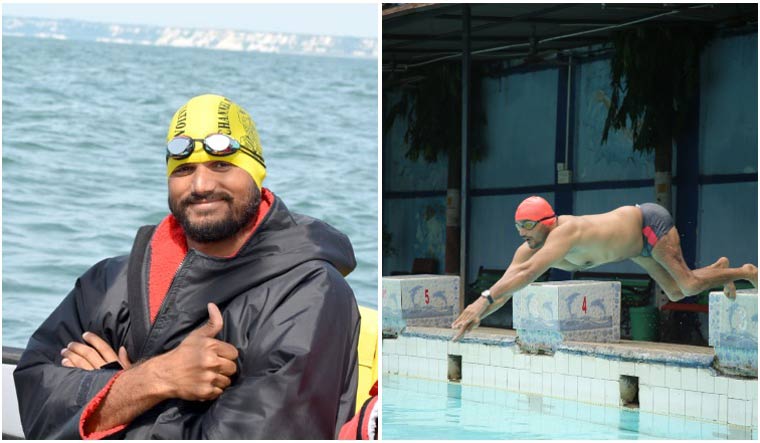Satendra Singh Lohiya is a powerhouse of mental strength and determination. Winner of the Tenzing Norgay Adventure Award 2020 by the Ministry of Youth Affairs and Sports, Lohiya, earlier this year, became the first Asian para-swimmer to crossed the 42km-Catalina Channel in the US in just 11.34 hours.
Lohiya lost movement in his legs at a young age, but soon swimming became his source of strength and happiness. He would swim in the river by his village Gata in Bhind district of Madhya Pradesh. That, too, without the knowledge of his parents as they would get worried. Questions raised by villagers about his future would echo loudly in his ears; many would even wonder why he was studying, when he would be better off collecting alms at the local temple instead. But it did not deter him.
Speaking to THE WEEK, Lohiya said, "I’ve never seen my disability as my problem. I consider it my superpower. I used what I lacked as my strength to achieve more. I would like to give the message that use what you lack as motivation to climb higher and make your family and country proud. The strength and will-power of the mind supersedes the bodily powers."
His dream to swim across seas and channels around the world has been ably supported by the TATA Trust, which helped him not just with financial resources abut also technical and training resources.
The 33-year-old has a degree and a diploma in computers and tally. He persuaded his father to allow him to study further; his dad agreed and sold the land in village to move his entire family to Gwalior. While pursuing his undergradutate degree, the passion for swimming was strong but financial constraints put brakes on it. His friend told him about Lakshmibai National Institute of Physical Education and soon Lohiya met the first most important person in his life as a para-swimmer—Dr V.K. Dabas. "He [Dabas] saw that I knew how to swim and decided to train me. We trained together for the next two years. We would get the pool there for an hour and I had to make the most of that time to train. There weren’t any special facilities for me. I have trained myself with minimal resources and I take pride in that," Lohiya said.
His first competition was the Kolkata X-National Paralympics Swimming Championship in 2009, where he won a bronze medal, which reaffirmed his belief that he could pursue swimming further. To sustain his dream of achieving success as a swimmer he applied and got a job in the Commercial Tax department in the MP government. But the job did not allow him enough time to train and so he left it soon after. He was awarded the Vikram award by the MP government in 2014—the highest award for sportspersons in the state. But Lohiya found out there weren't any provisions for para-athletes and so he went to court, challenged the state government policy and won the case, ensuring the MP government created a policy for para-athletes.
In 2014, he decided to swim across the English Channel but it took him four years to achieve it. In August 2019, he crossed the Catalina Channel through a relay. He has participated in six national level competitions and three international competitions.
In an interaction with THE WEEK, he shared the various challenges he faced while swimming across the English Channel and other long distance swims, and his plans. Excerpts:
Q) Tell us about your planning and preparation ahead of swimming across the English Channel?
A) I came across Rohan More from Pune, who, then, had crossed seven channels. I reached out to him for guidance and he agreed to help me. Arranging for funds to train, travel, and complete this channel was going to be a challenge. London is an expensive place. I applied for sponsorships at several places, I heard from nowhere except Tata Trusts. They called me and told me that they had seen my accolades and asked me to fill a form. They told me they would support me in my endeavours. However, I couldn’t cross the English Channel in 2017, which was my first attempt. For the next one year, I rigorously trained under More in Pune. I went back to the English Channel in 2018 with my fellow para-swimmers. I went to England in May 2018 and crossed the English Channel through a relay in June.
Q) What were the challenges while swimming long distances given your disability?
A) There were a lot of question marks about whether my disability would allow me to sustain or if I would ever be independent in life. I wanted to leave a lasting legacy. I wanted people to remember me. I wanted to be an inspiration for others. I didn’t want to ponder over what I lacked, but wanted to focus on what I could do with what I had and make the most of it. When you swim in a river, it is usually calm. A sea is more vociferous and has waves which swimmers need to train to navigate through. I believe strengthening one’s mind in such cases serves as the strength to do it all. All the people who then doubted me have told me that I took a great step by moving to Gwalior and chasing my dream.
Q) Which swim did you find was the most tough and challenging so far?
A) English Channel was the most challenging. My instructor was also a pillar of support in helping me access the training facilities I needed. It was also challenging because this was my first time swimming outside India. The water is very cold. The water is 11 degrees Celsius. To prepare myself mentally was important. Additionally, the pressure of not wanting to let my supporters and sponsors down was there. I didn’t want to disappoint anyone. As I said, a lot of people were hesitant to sponsor me for the English Channel. To prove to the then director in the sports office, Bhopal, I swam in the Arabian Sea across 33km in 5 hours 42 minutes. He still didn’t believe in me. I had decided to go back to his office only with the certificate that I had crossed the English Channel. I was now determined.
For the training in Pune, I would shut the lights at the pool and train in the dark to prepare myself for swimming in the night. I even went there three months in advance to acclimatise my body to the cold water. Eventually, we crossed the English Channel in 11 hours. The day I walked into the director’s office with my certificate, he had tears in his eyes.
Q) How did you cope with COVID-19 restrictions on swimming?
I used to meditate and practice yoga every morning. I also used to exercise at home since access to swimming pools was restricted. Moreover, I focused towards building my immunity which has kept me healthy.
Q) Your plans?
I was supposed to cross the North Channel in August, but plans got delayed due to the COVID-19 pandemic. I am preparing to cross the North Channel in Ireland on September 3, 2021. I also want to cross the Seven Seas. In the long-term, I want to open a para-swimming academy for disabled children. I want to provide a platform for para-athletes from the rural regions to recognise their hidden talents and pursue their dreams.







